Diamond Education
Diamond Certification
Diamond certification is a critical element in the process of buying a diamond. It not only provides a buyer with the assurance of the diamond's quality but also its authenticity. Understanding the significance of diamond certification can transform your purchasing experience, ensuring you obtain the value you expect for your investment. This article will explore diamond certification in detail, including an overview of the major global certification institutions and the unique attributes of their certification processes. We'll also delve into recent changes in the certification landscape, including the acquisition of the American Gem Society (AGS) labs by the Gemological Institute of America (GIA).
Summary:
- What is Diamond Certification?
- The Unification of AGS and GIA
- GIA (Gemological Institute of America)
- IGI (International Gemological Institute)
- EGL (European Gemological Laboratory)
- GCAL (Gem Certification & Assurance Lab)
- HRD (Hoge Raad voor Diamant)
- How to Choose the Right Lab
- Where to Find Certified Diamonds
What is Diamond Certification?
Diamond certification, often referred to as a diamond grading report, is a detailed document issued by a professional gemological lab. The certification provides an unbiased assessment of a diamond's attributes and overall quality. These labs employ experienced gemologists who use advanced tools and techniques to evaluate each diamond meticulously.

The core aspects that a certification report evaluates are often referred to as the Four Cs of diamond quality: Cut, Color, Clarity, and Carat weight.
Cut: This refers to how well the diamond has been cut from its raw form, which can significantly impact its brilliance and sparkle.
Color: This assesses the presence of any color in a diamond, with the most valuable diamonds being completely colorless.
Clarity: This denotes the presence of any internal or external flaws, known as inclusions and blemishes, respectively.
Carat Weight: This is the measurement of how much a diamond weighs, not its size.
These attributes contribute to the overall value of a diamond and, therefore, are critical for any buyer to understand before making a purchase. A diamond certification report also contains additional information such as diamond's symmetry, fluorescence, and proportions, among other things.
The Unification of AGS and GIA
In a significant development, the American Gem Society (AGS) announced the closure of its laboratories and the merging of its operations with the Gemological Institute of America (GIA) in 2023. This will allow AGS to focus on its original vision as a trade organization and enhance its retailer programs and member education opportunities.
Founded by Robert M. and Beatrice Shipley in the 1930s, both AGS and GIA have collaborated in the past and share a common mission for the trade and consumers. With the merger, the AGS Labs research staff, intellectual property, technology, and Las Vegas facility will be integrated into GIA, which will utilize the facility as a center for research. The collaboration aims to develop new products and services to protect consumers and support the trade, like light performance research and a science-based fancy cut grade standard.
A new report called the "AGS Ideal Report" will be made available by GIA as a digital supplement to its diamond reports for round brilliant and fancy shape diamonds. This report, which grades light performance, will combine with the four Cs grading from GIA, incorporating AGS's popular cut grading system. Clients will be able to request these supplemental reports, however some vendors including Whiteflash do provide these.
GIA Diamond Certification
The Gemological Institute of America (GIA) is renowned for its rigorous diamond grading process, ensuring the highest level of objectivity and independence. Every diamond submitted to GIA is examined to ensure its anonymity, removing or concealing all references to its owner. Each diamond is placed in a custom storage case and assigned a unique identification number to track it throughout the process.
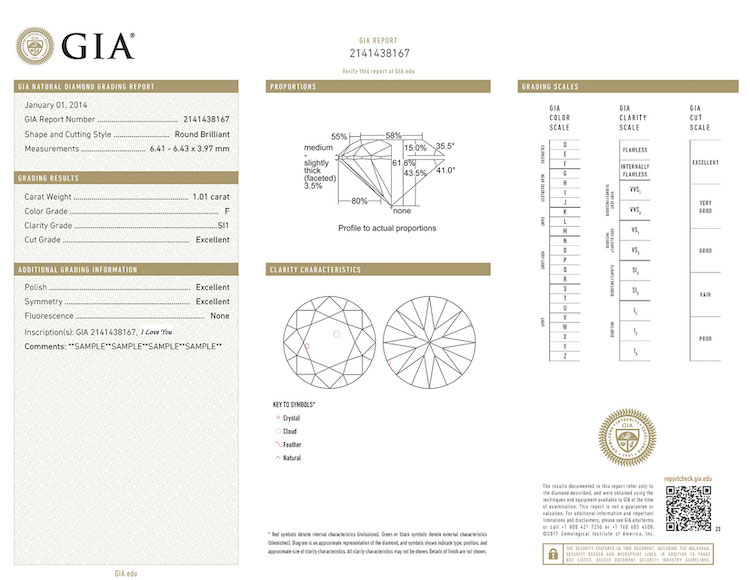
GIA's grading process includes multiple steps: grading color in a standardized environment, grading clarity with 10x magnification under standard viewing conditions, and grading cut only for standard round brilliant diamonds in the GIA D-to-Z color range. The diamond's proportions, brightness, fire, scintillation, weight ratio, and durability, along with its polish and symmetry, are all considered within this final assessment of cut quality.
A GIA diamond certificate contains crucial information about a diamond's 4Cs — color, clarity, cut, and carat weight — along with other details. More information about the features of a GIA certificate will be provided once available.
IGI Certification
The International Gemological Institute (IGI) is a renowned organization dedicated to the research, grading, and certification of gemstones and diamonds. Established in 1975, the IGI has become one of the most respected gemological institutes worldwide. It operates from its headquarters in Antwerp, Belgium, and has expanded its reach to several global locations, including New York, Hong Kong, Mumbai, Bangkok, Tokyo, Dubai, and Toronto.
Explanation of the IGI certification process
The IGI certification process entails a meticulous examination and evaluation of diamonds to determine their quality and authenticity. The institute's trained gemologists employ internationally recognized grading standards to assess various factors that influence a diamond's value and desirability. These factors include the diamond's cut, color, clarity, and carat weight. Additionally, the IGI certification process also examines other characteristics such as symmetry, polish, fluorescence, and potential treatments or enhancements.
When certifying lab-grown diamonds, the IGI has earned a strong reputation for its accuracy and reliability. As lab diamonds possess consistent characteristics, they can be graded with a higher level of certainty and accuracy.
Key features of an IGI diamond certificate
An IGI diamond certificate offers comprehensive information about the diamond's attributes, enabling buyers to make informed decisions. While the IGI has been highly regarded for grading lab-grown diamonds, it is worth noting that there have been instances where overgrading has occurred with natural diamonds. Therefore, caution is advised when relying solely on IGI certification for natural diamonds.
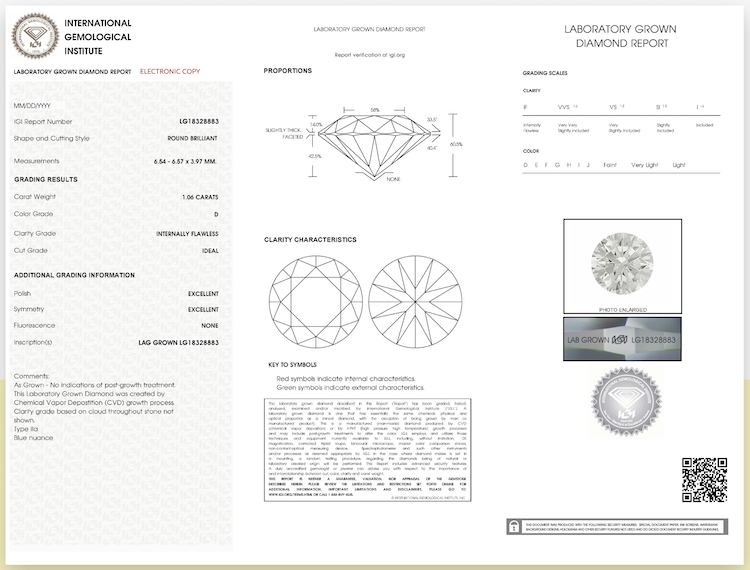
Key features typically included in an IGI diamond certificate are as follows:
Identification: The certificate provides details such as the diamond's shape, carat weight, and measurements for accurate identification.
Cut: The IGI assesses the diamond's cut quality, including aspects such as proportions, symmetry, and polish, which influence its brilliance and fire.
Color: The IGI grades the diamond's color on a scale ranging from D (colorless) to Z (light yellow or brown), providing an objective evaluation of its color intensity.
Clarity: The IGI evaluates the diamond's clarity, determining the presence of internal and external flaws, known as inclusions and blemishes, respectively.
Carat Weight: The certificate specifies the diamond's exact weight in carats, a standard unit used to measure gemstones.
Additional Features: The IGI diamond certificate may also mention other characteristics such as fluorescence, measurements, proportions, and potential treatments or enhancements.
Security Features: To ensure the authenticity and integrity of the certificate, IGI incorporates various security features, such as holograms, unique identification numbers, and tamper-evident packaging.
While the IGI certification has been widely trusted for lab-grown diamonds due to its accuracy, it is essential to exercise caution when relying solely on IGI certification for natural diamonds.
Overgrading cases have been reported, emphasizing the importance of obtaining multiple independent certifications and seeking the advice of experienced professionals when purchasing natural diamonds.
EGL (European Gemological Laboratory) Certification
The EGL (European Gemological Laboratory) is an established gemological institute that offers diamond grading and certification services. Founded in Europe in the 1970s, EGL has expanded its operations to various locations worldwide, including the United States, Europe, and Asia. However, it is important to note that EGL has faced significant controversies and concerns regarding its grading practices.
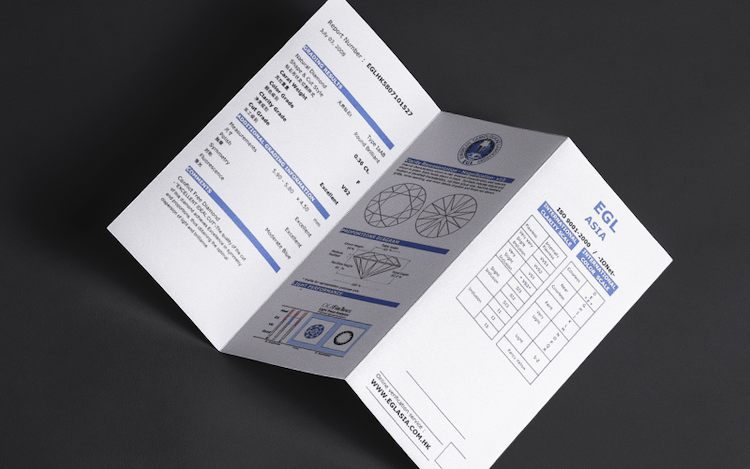
Overgrading and Controversies
One of the primary concerns associated with EGL certification is the issue of overgrading. Over the years, there have been numerous cases where diamonds certified by EGL have received grades that are higher than those assigned by other reputable grading institutes. This discrepancy in grading has led to controversies and disputes within the diamond industry.
The main cause of these controversies is the perception that EGL tends to assign more lenient grades, particularly in the areas of color and clarity, compared to other well-known grading laboratories such as GIA (Gemological Institute of America) or AGS (American Gem Society). As a result, EGL-certified diamonds may be perceived as having better qualities than they actually possess.
The concerns surrounding EGL's grading practices have led to a lack of confidence in the consistency and reliability of their certifications. This discrepancy in grading standards has caused confusion among consumers and industry professionals, as it becomes challenging to accurately assess the true value and quality of an EGL-certified diamond.
It is worth noting that the controversies surrounding EGL certifications are not universal across all EGL locations. Different EGL branches may operate independently, and their grading practices and standards may vary. Therefore, it is crucial for buyers to consider the specific EGL branch that issued the certification and to be aware of the potential variances in grading standards.
The Importance of Independent Verification
Due to the controversies and concerns surrounding EGL certifications, it is recommended that buyers seek independent verification from reputable grading laboratories such as GIA or AGS. Obtaining a second opinion from a trusted and unbiased grading institute helps ensure that the diamond's characteristics, such as cut, color, clarity, and carat weight, are accurately represented.
Independent verification provides peace of mind and helps buyers make informed decisions based on reliable and consistent grading standards. It is advisable to rely on certifications from grading institutes with a strong reputation for their rigorous and consistent grading practices to minimize the risk of overpaying or misunderstanding the true quality of a diamond.
In conclusion, EGL certifications have been associated with controversies and concerns, particularly regarding overgrading. Due to the discrepancies in grading standards, it is essential to exercise caution when considering diamonds certified by EGL. Seeking independent verification from reputable grading laboratories is crucial to ensure accurate and reliable assessments of a diamond's quality.
GCAL (Gem Certification & Assurance Lab) Certification
GCAL (Gem Certification & Assurance Lab) is a respected gemological laboratory that offers diamond grading and certification services. Known for its strict grading standards and comprehensive evaluations, GCAL provides reliable and transparent certifications for diamonds. Let's delve into the key aspects of GCAL certification.
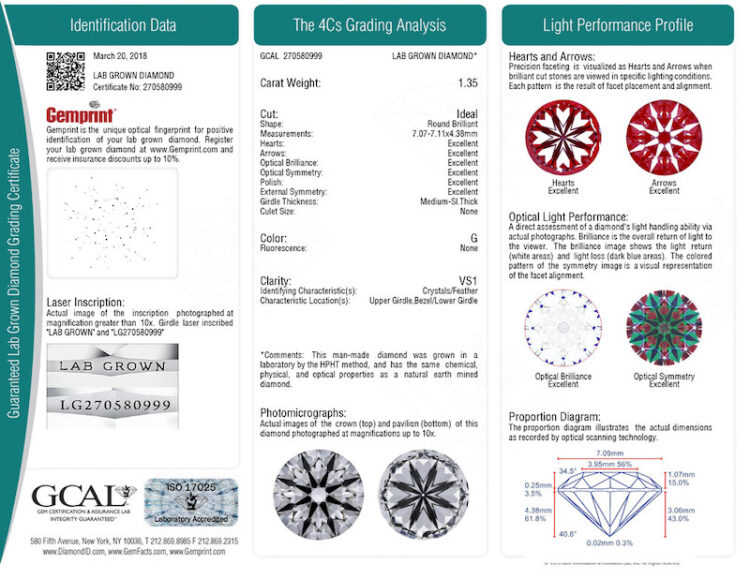
Rigorous Grading Standards and Transparency
GCAL follows a stringent grading process to ensure accurate and consistent assessments of diamond quality. The laboratory employs advanced technology, expert gemologists, and precise grading protocols to thoroughly evaluate various aspects of a diamond, including cut, color, clarity, and carat weight.
GCAL places significant emphasis on transparency and provides detailed information about the diamond's characteristics and attributes on its certification documents. This transparency enables consumers to make informed decisions and have a clear understanding of the diamond's quality.
Full Spectrum Light Performance Analysis
One notable feature of GCAL certification is its Full Spectrum Light Performance Analysis. This analysis assesses a diamond's brilliance, fire, and scintillation, which are essential components of its visual appeal. GCAL utilizes sophisticated light performance measurement tools and advanced imaging technology to evaluate a diamond's light performance accurately.
The Full Spectrum Light Performance Analysis provides an in-depth assessment of a diamond's light behavior, ensuring that it possesses exceptional beauty and sparkle. This information enables buyers to understand the diamond's visual characteristics beyond the traditional grading parameters.
Gemprint® Technology
GCAL incorporates Gemprint® technology in its certification process. Gemprint® is a non-invasive laser technology that creates a unique digital fingerprint of each diamond. This technology allows for easy identification and verification of a diamond's authenticity, serving as an additional security feature.
By using Gemprint®, GCAL enhances consumer confidence by providing a reliable method of confirming the identity of a certified diamond. This feature adds an extra layer of security and peace of mind for buyers.
GCAL's Reputation and Industry Recognition
GCAL is highly regarded within the diamond industry for its accurate grading practices and commitment to transparency. Its certifications are recognized and trusted by industry professionals, including diamond wholesalers, retailers, and consumers.
The consistency and reliability of GCAL's grading standards contribute to its strong reputation. Buyers can rely on GCAL certifications to provide an objective evaluation of a diamond's quality, ensuring that the diamond meets or exceeds the stated criteria.
HRD (Hoge Raad voor Diamant) Certification
HRD (Hoge Raad voor Diamant), also known as the Diamond High Council, is a well-established diamond grading and certification institute based in Antwerp, Belgium.
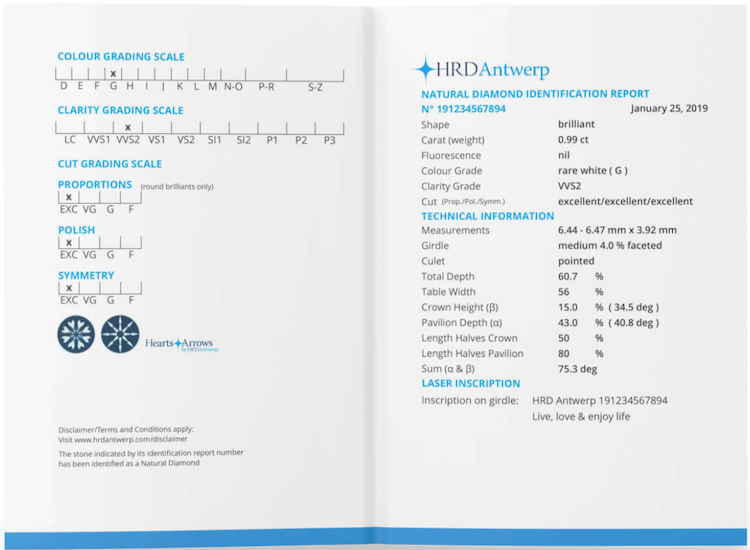
Here are some key points regarding HRD certification:
- HRD is renowned for its expertise in diamond grading and certification, particularly for natural diamonds. They employ strict grading standards and comprehensive evaluation methods to determine a diamond's quality.
- HRD certifications provide detailed information about a diamond's 4Cs (cut, color, clarity, and carat weight) and other characteristics such as fluorescence, proportions, and polish.
- HRD is recognized internationally for its reputable grading practices, and its certifications are trusted by industry professionals and consumers alike.
- HRD offers additional services, such as diamond inscription and laser engraving, to enhance the security and traceability of certified diamonds.
- It's important to note that HRD has faced some controversies and criticism regarding inconsistencies in grading standards in the past. However, the institute has taken steps to address these concerns and improve its grading practices.
Overall, HRD certification is considered reliable and carries some prestige within the diamond industry. Buyers can confidently rely on HRD certifications to obtain accurate information about a diamond's quality and make informed purchasing decisions, however they do not have the same prestige as the GIA.
How to Choose the Right Lab
When purchasing a certified diamond, choosing the right gemological laboratory is crucial to ensure accurate grading and reliable certification. Here are some factors to consider when selecting a lab:
1. Reputable and Established Labs: Look for labs with a strong reputation and a history of reliable grading practices. Leading gemological institutes such as GIA (Gemological Institute of America) and AGS (American Gem Society) are widely recognized for their consistent and stringent grading standards.
2. Grading Standards and Consistency: Each gemological laboratory may have its own grading standards. GIA and AGS are known for their strict grading criteria and consistency, making their certifications highly reliable for natural diamonds.
3. Lab-Grown Diamonds: For lab-grown diamonds, IGI (International Gemological Institute) has gained recognition for its accurate and consistent grading practices. IGI certifications provide reliable information about the quality and authenticity of lab-grown diamonds.
Considering these factors, it is recommended to opt for GIA or AGS certifications when purchasing natural diamonds. Their certifications carry a high level of trust and are widely accepted in the industry. For lab-grown diamonds, IGI certifications are a reliable choice.
Where to Find Certified Diamonds
Additionally, James Allen and Blue Nile are popular online retailers that offer a vast inventory of diamonds at various price points. While they may not provide the same level of quality as GIA, AGS, or IGI certifications, they offer competitive pricing options and a convenient online shopping experience.
Remember, when investing in a diamond, it is important to prioritize quality and reliable certification. Choose GIA or AGS for natural diamonds and IGI for lab-grown diamonds to ensure you're making an informed and confident purchase.
